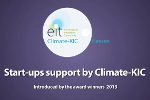RENEWABLE JET – Fuel Supply Chain Development and Flight Operations
Challenge Platform: Bio-Economy
Project Start Date: 11/2013
Lead partner: Schiphol Nederland, NL
Project type: Innovation – Develops and brings to market climate relevant knowledge, products and services
Project lead: Jonas van Stekelenburg, RENEWABLE JET
Partners
This project involves 6 partners in 2 European countries:
- Schiphol Nederland, The Netherlands, (Climate-KIC Core Partner)
- KLM, The Netherlands, (Climate-KIC Core Partner)
- SkyNRG, The Netherlands
- Universiteit Utrecht, The Netherlands, (Climate-KIC Core Partner)
- Imperial College London, UK, (Climate-KIC Core Partner)
- DSM, The Netherlands, (Climate-KIC Core Partner)
Concept
The aviation industry is a substantial contributor of carbon emissions, and unless efforts are made to transform the industry both air traffic and emissions are predicted to intensify. Aviation depends on liquid fuels with high energy density. Compared with conventional jet fuel, renewable jet fuel will deliver life-cycle CO2 reductions of 60%. Hence, these bio-fuels could deliver essential reductions on aviation emissions.
The climate change issue
Today, aviation accounts for more than 2% of global CO2 emissions. With growth forecasted to reach approximately 3-5% of global CO2 emissions by 2050, it is imperative that alternative fuels are considered. The environmental impact of fuel combustion and the insecurity of affordable and stable fuel prices constitute serious risks to a sustainable future in aviation.
At current prices, fuel makes up 30% of an airline’s cost. But with the volatility of fuel prices it is hard for airlines to generate stable profits. In the short-term airlines don’t have the option to take control over the supply chain which is currently dominated by oil industry leaders. Competitiveness is scarce as the renewable jet fuel market is still in its infancy.
The Project Solution
Renewable jet fuel is the only solution that can address both the risk of greenhouse gas emissions and the issue of fuel prices. The aviation industry, therefore, considers it an essential contribution to its transition to a low carbon society. However the infancy of the renewable jet fuel market continues to act as barrier to its implementation.
Renewable jet fuels are currently produced in small volumes at a high price. This is down to the lack of production locations. As a result there is a significant difference between the price of fossil fuels and renewable jet fuels, meaning the aviation industry is unable to pay high prices for renewable jet fuels.
The RENEWABLE JET project aims to contribute to the structural usage of renewable jet fuel. To do this, scarce resources must be directed towards the commercial scale-up of renewable jet fuel. To bridge the price premium in the short-term, The RENEWABLE JET project will create different financial and business models to generate demand - supported by end users in the project, Schiphol and KLM. In terms of directing resources towards renewable jet fuel, supply chains delivering to selected airports will be created. This will lay the foundation for renewable jet fuel to become a commonly used product by the aviation industry.
The role of Climate-KIC
Climate-KIC has supported the project in several ways. It provided funding and an invaluable network enabling RENEWABLE JET to pick up partners with expertise in specific areas. Climate-KIC also strengthened the project ethically and informed the sustainability of the project.



